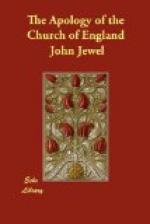So that if they weigh the very matter with earnest
and upright advisement, this thing is a great argument,
that this same is the very truth of the Gospel of
Christ, which we do teach. For lightly neither
is cockle wont to grow without the wheat, nor yet
the chaff without the corn. For from the very
Apostles’ times, who knoweth not how many heresies
did rise up even together so soon, as the Gospel was
first spread abroad? Who ever had heard tell
of Simon, Menander, Saturninus, Basilides, Carpocrates,
Cerinthus, Ebion, Valentinus, Secundus, Marcosius,
Colorbasius, Heracleo, Lucianus, and Severus, before
the Apostles were sent abroad? But why stand
we reckoning up these? Epiphanius rehearseth
up fourscore sundry heresies; and Augustine many more,
which sprang up even together with the Gospel?
What then? Was the Gospel therefore not the
Gospel, because heresies sprang up withal? or was
Christ therefore not Christ? And yet, as we said,
doth not this great crop and heap of heresies grow
up amongst us, which do openly, abroad, and frankly
teach the Gospel. These poisons take their beginnings,
their increasings, and strength, amongst our adversaries,
in blindness and in darkness, amongst whom truth is
with cruelty and tyranny kept under, and cannot be
heard but in corners and secret meetings. But
let them make a proof: let them give the Gospel
free passage: let the truth of Jesu Christ give
his clear light, and stretch forth His bright beams
into all parts: and then shall they forthwith
see how all these shadows straight will vanish and
pass away at the light of the Gospel, even as the
thick mist of the night consumeth at the sight of the
sun. For whilst these men sit still, and make
merry and do nothing, we continually repress and put
back all those heresies which they falsely charge
us to nourish and maintain.
Where they say, that we have fallen into sundry sects,
and would be called some of us Lutherians, and some
of us Zuinglians, and cannot yet well agree among
ourselves touching the whole substance of doctrine:
what would these men have said, if they had been in
the first times of the Apostles and holy fathers,
when one said, “I hold of Paul;” another,
“I hold of Cephas;” another, “I
hold of Apollo;” when Paul did so sharply rebuke
Peter; when, upon a falling out, Barnabas departed
from Paul; when, as Origen mentioneth, the Christians
were divided into so many factions, as that they kept
no more but the name of Christians in common among
them, being in no manner of thing else like unto Christians;
when, as Socrates saith, for their dissensions and
sundry sects they were laughed and jested at openly
of the people in the common game-plays; when, as Constantine
the emperor affirmeth, there were such a number of
variances and brawlings in the Church, that it might
justly seem a misery far passing all the former miseries;
when also Theophilus, Epiphanius, Chrysostom, Augustine,
Ruffine, Hierom, being all Christians, being all fathers,




